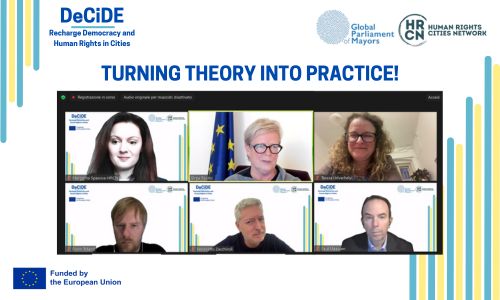“Where, after all, do universal human rights begin? In small places, close to home – so close and so small that they cannot be seen on any maps of the world.” Eleanor Roosevelt
Monitoring human rights at the local level is a fundamental step to becoming a human rights city and ensuring the rights of people are upheld. Local actors can face challenges in putting this into practice. To address this, the Human Rights Cities Network (HRCN) held the webinar “Human Rights Monitoring: Turn Theory into Practice”, on 17 December 2024, as part of our “DeCiDE – Boost Democratic Participation in Cities to Recharge Democracy in Europe” project, in collaboration with the Global Parliament of Mayors
The moderator Margarita Spasova, Acting Director of the HRCN, was joined by an exciting panel:
- Dr. Éva Tessza Udvarhelyi: Deputy Mayor of Józsefváros, who is one of the participants of the DeCiDe project, as opening speaker;
- Sirpa Rautio: Director of the European Union Agency for Fundamental Rights, as keynote speaker;
- Paul Maassen: Chief of Global Programmes at Open Government Partnership;
- Benedetto Zacchiroli: President of the European Coalition of Cities Against Racism;
- Fionn Toland: Researcher at the Centre for Applied Human Rights at the University of York.
All the panelists highlighted the power that local actors have to fulfill and protect the rights of people, but that they need to take a participatory approach to monitoring and data collection. On this, Mr. Masseen underscored the importance of adopting a bottom-up approach, where communities actively co-create and shape solutions to the challenges they face – a strategy closely aligned with the mission of our DeCiDE project. The participatory approach of co-creating monitoring indicators with the involved cities is a crucial aspect of our project.
“Working for the people, with the people,” emphasised Mr. Masseen.
The Importance of Monitoring and Data-Driven Policy
Data is imperative to empowering local actors in making informed decisions and driving sustainable, community-driven solutions. The collection of good data is both essential and labour-intensive, as acknowledged by Ms. Rautio. She highlighted the importance of collecting data from many different sources, such as civil society organisations, local ombudsman, and academia. This was reiterated by Mr. Toland, who explained that the York Human Rights City Network uses case studies from local civil society organisations. The Fundamental Rights Agency carries out widespread surveys, collecting thousands of data points, such as on Roma populations and gender-based violence, that can help local actors understand the issues at hand and what types of services are required. Ms. Rautio suggested that looking at these resources is not only important for the data itself, but also to understand the methodology that can be adapted by local actors to fit their research needs.
Monitoring human rights in local policies and services is also imperative to ensuring accountability, promoting equity, and verifying that policies truly benefit the rights holders they are designed to protect. Mr. Zacchiroli shared that the European Coalition of Cities Against Racism has a data working group and a software where all cities can fill in yearly with their data and best practices, allowing them and the organisation to track their progress. He highlighted that this is also important for policymakers in the member cities because the findings are used to evaluate the efficiency of their policies.
There were queries amongst the attendees about how to collect data when one has limited manpower. Mr. Toland responded that, at the York Human Rights City Network, the data collection is done by external institutions. Then he alone gathers it, but involves civil society organisations and local political representatives in the analysis. This shows that it is possible to collect data in a small team with limited resources, and that engaging relevant stakeholders can facilitate the process.
Best City Practices from the Webinar
The panelists shared many good practices, not only in terms of monitoring, but also what cities can do to improve human rights oriented services at the local level. Ms. Rautio shared an important framework, which the Human Rights Cities Network contributed to, with concrete examples on how to become a Human Rights City.
Cities play a big role in upholding the rights of people. Despite being one of the poorest districts in Budapest, Ms. Udvarhelyi stated that the municipality of Józsefváros has created a stronger safety net for its residents as that of the national level was deemed insufficient by the municipality. This demonstrates that using a human rights based approach is possible on a smaller budget. It also shows how municipalities can provide solutions for national problems and shortages. In a similar vein, Mr. Zacchiroli explained that to counter Italy’s restrictive nationality laws, Bologna introduced an honorary citizenship 10 years ago to all newborns in Bologna with foreign parents. Although more symbolic than concrete action, it demonstrates how cities can change the narrative and make people feel more included— an essential step in addressing the divisions present in today’s society.
Streamlining citizen participation is imperative to ensure reforms and better implementation of solutions. Józsefváros was the first district to open an office of community participation in the country, a practice that has now spread to other municipalities. Mr. Masseen gave the example of Decide Madrid that began in 2015 to promote participatory budgeting, which has since been used in over 100 places. Similarly, the York Human Rights City Network chose its five priority rights based on public surveys given to the local communities, and the indicators were chosen through focus groups which were held with local civil society organisations. This further highlights the need for a participatory approach– a running theme throughout the webinar.
This webinar was filled with insightful discussions and exchanges of best practices, offering participants valuable perspectives and actionable strategies. The collaborative environment fostered meaningful dialogue, inspiring innovative approaches to address shared challenges.
Learn more about our EU-funded DeCiDE project.



